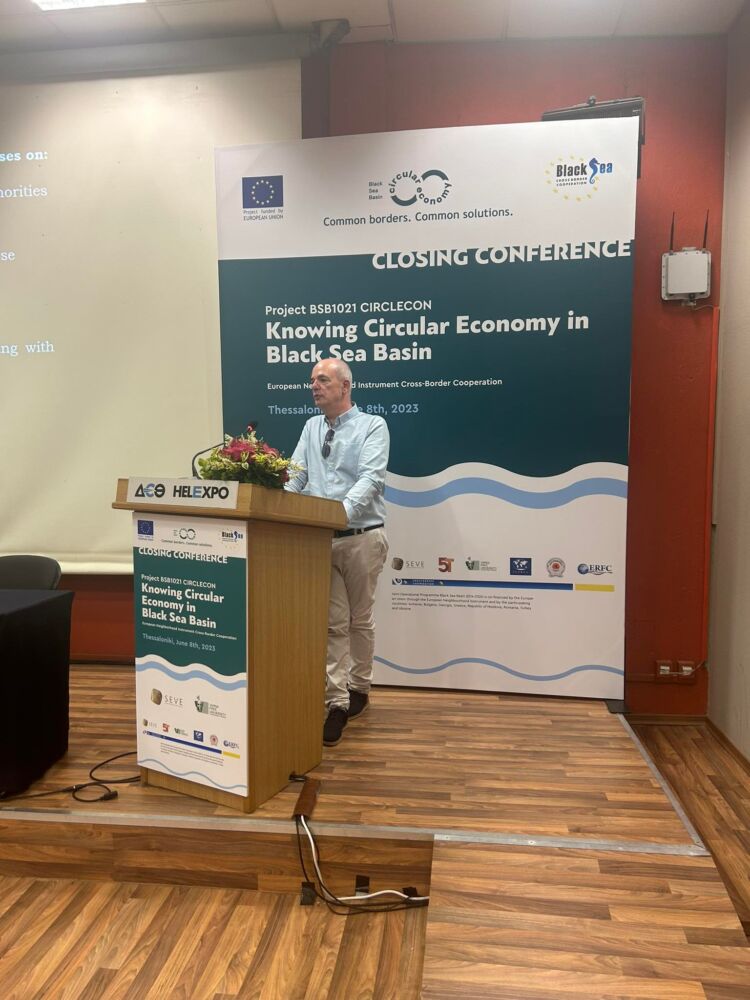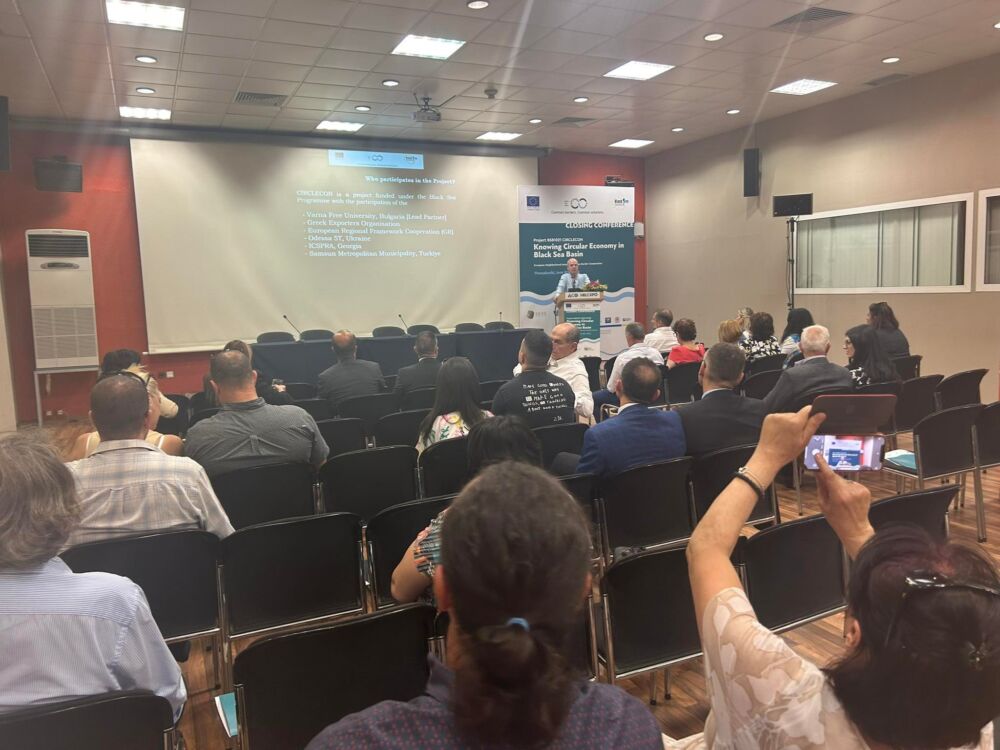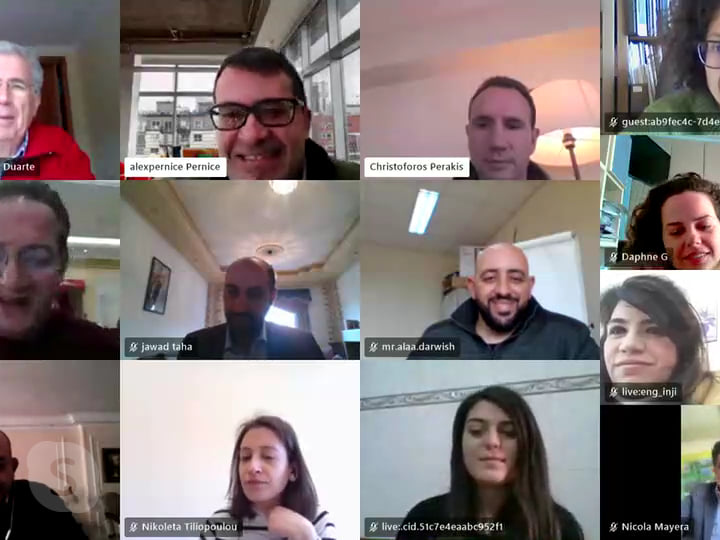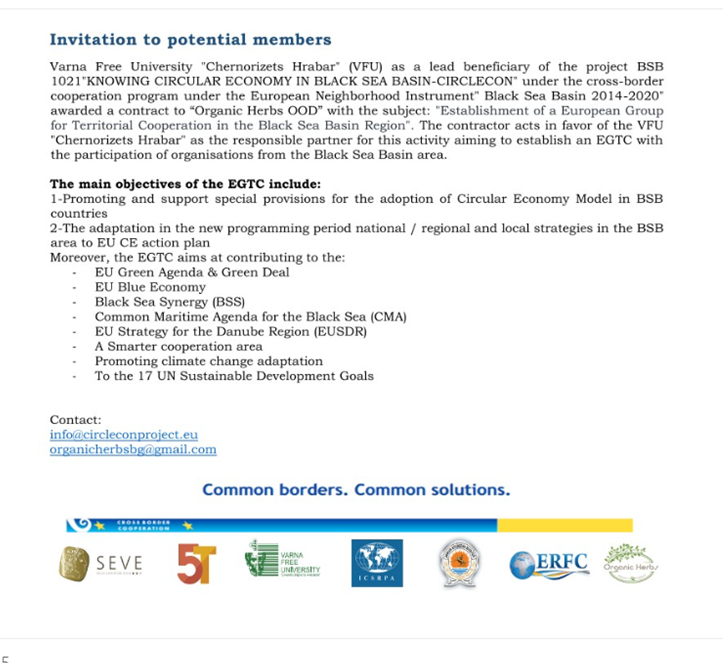The project “Knowing Circular Economy in Black Sea Basin” (the BSB – “CIRCLECON”), which has been carried out under the auspices of the EU-funded Joint Operational Programme “Black Sea Basin 2014-2020” aims at promoting CE model in Black Sea basin to help Bulgaria, Georgia, Greece, Turkey and Ukraine accelerate transition to a resource-efficient and regenerative circular economy contributing to regional competitiveness, innovation and economic growth, employment and value added across sectors, sustainable development and social welfare hold it’s final event in Thessaloniki, during the Fordward Green Expo. International guests of the Eni CB Med projects, where also there and enjoyed the big final event. Before the begining of the final Circlecon event took place several B2B meetings among the Steakholders of Greenland, and the Haskovo Chamber of Commerce, The Greek- Italian Chamber of Commerse and the Greek- Indian Chamber of Commerce.
Here are some of the Hight lights of the Final Event.
The project is focused on awareness raising and knowledge transfer at local, regional and national level, through providing promotional campaigns, education and research activities in each partner territory. A final event was organised and took place in the Thessaloniki, named FORWARD GREEN EXPO. CIRCLECON’s Stakeholders had the opportunity to talk about all circular economy matters and have fruitful conversations. The President of ERFC, Mr. Nikolas Petropoulos and the Project Manager of Circlecon, Mr. Alkis Stavridis has put the corner stone in the mediterranean cooperation, bei the MOU and the establishment of the Circular Economy Institute in Mediterranean area.


Before this, the Chamber of Haskovo, the Greek – Indian and the Greek- Italian Chamber of Comerce they had at the pavillion of , Macedonian Branding area of SEVE a very successful B2B with other Steakholders of the CB CARBON FREE PROJECT and the Greenland Project.
The concept of a circular economy has gained significant attention in recent years as societies around the world seek innovative solutions to tackle the environmental challenges posed by our current linear economic model. During Greenland, the Mediterranean network to tackle extremely high rates of youth unemployment and Values of Circular Economy in 7 countries. Greenland is a groundbreaking initiative aimed at promoting circular economy and green sustainability in the Mediterranean region. It is a collaborative effort between several European Union countries and partner countries in the Mediterranean, and it seeks to address the pressing environmental challenges facing the region. Some of the project partners, such as the ARCES university, the ERFC Institute and the university consultancy PDA have participated in a special TV show, the first cycle, with honored guest the General Secretary of Forest Pr. Ph.D Konstantinos Aravossis, who analyzed the entire spectrum of Greek political strategy in the field of green sustainable development and economy. In the second cycle will participate the other Stakeholders, Mr. Nicola Mayera and some of the NEETS in several languages to share their experiences to participate to GREENLAND
Already on March of 2021 Egypt has orginized the zoom Kick- off meeting . Arab Academy for Sciences and Technology and Maritime Transport (AASTMT) -representing Egypt -is joining the launching of Kick of Meeting of Work Package 3 represented by Lebanon in GREENLAND Project via Skype on the 4th of March 2021. During this meeting , the work plan for WP3 has been discussed with all the partners including Jordon , Italy , Greece ,Portugal , and Calabria Region .Thanks EU for supporting financially Green skills for a sustainable Development ” GREENLAND”. and after this has host all the participant countries in Egypt.

In Thessaloniki, after many zoom calls they took place the third Jobschadowing, among ARCES and the Head Leader for European Programms, Mr. Alessandro Pernice, the President of ERFC, Mr. Nikolaos Petropoulos, and the Head Leader of Hisham Hijjawi College of Technology, Nablus, Palestine (Partner) (PSE) , Mr. Alaa Darwich the palestinian delegation is invited to participate in a B2B event with other three Chamber of Comerses’, the Chamber of Comerse of Haskovo, the Greek- Indian Chamber of Commerse, and the Greek- Italian Chamber of Commerse. Despite that, they were invited to participated in a Jobschadowing with honored guest the Head Leader of the Greek Jobs Community, Ms Evi Egiarde in aim to strive bridges about business culture exchange among Greece and Palestine and they were the honored guest for the final event of Circlecon.
Also Mr. Staikos Giorgos was invited to the second stage of the Jobshadowing which took place in Greece, at Hotel Panorama to present new inovative eco- materials in the 3D- printed architecture and to demonstrate also new solar panels with a specific eco nano paste.
During the B2B Professor Giorgos Zalidis and the Head Leader of I- BECK with Professor Mohammed Jusuf of the Arab Academy had the opportunity for a productive dialogue with the President of ERFC, Mr. Nikolas Petropoulos who made the introductory session and welcome them to the founding of the EGTC.
EGTC (European Grouping of Territorial Cooperation) Framework
The EGTC Regulation (EC) No 1082/2006 applied on 1 August 2006 and on 17 December 2013 in
the Official Journal of the EU the Revised EGTC Regulation (EU) No 1302/2013 of the European
Parliament that applies from 22 June 2014.
Objective and tasks
The EGTC is the first European cooperation structure with a legal personality defined by European
Law, designed to facilitate and promote territorial cooperation (cross-border, transnational and
interregional cooperation), in view of strengthening the Union economic, social, and territorial
cohesion. An EGTC may carry out actions of territorial cooperation, with or without a financial
contribution from the EU (Art. 7 of the EGTC Regulation).
Legal personality
The EGTC has a legal personality and capacity recognised by EU law: it can acquire property, hire
personnel, be party to legal proceedings (Art.1). Legal personality is acquired on the day of the
registration and/or publication (whatever is first) of its convention and the statutes (Art.5).
Implementation aspects
The EGTC may be given the possibility to act on behalf of its members;
In any case, it shall act within the confines of the tasks given. It is not authorised to exercise
powers conferred by public law to safeguard general interests of the State: police, regulatory
powers, justice, foreign policy;
One member may be empowered to execute the EGTC’s tasks.
Applicable law
The EGTC is governed by the Regulations (EC) 1082/2006 and 1302/2013 and these Regulations are
complemented by national provisions adopted by each Member State. When an EGTC is created, it is
governed by the above regulations, the provisions of the Convention and the Statutes adopted by the
EGTC’s members and the Law of the Member State where the EGTC has its registered office.
Possible members of an EGTC are:
Member States or authorities at national level
Regional authorities
Local authorities
Public undertakings within the meaning of point (b) of Art. 2(1) of Directive 2004/17/EC
Bodies governed by public law following Art. 1(9), 2nd sub§ of Directive 2004/18/EC
Undertakings entrusted with operations of services of general economic interest (SGEI) in
compliance with applicable Union and national law (NEW!)
National, regional or local authorities, or bodies or public undertakings equivalent to the
defined above coming from the neighboring third countries as the defined in the revised Art
3a EGTC Regulation.
As a general rule, an EGTC must be composed of at least two members coming from at least two EU
Member States. The Revised EGTC Regulation (new Art. 3a) allows accession of members from third
countries or overseas countries of territories under certain conditions.
Convention and statutes
The EGTC’s members conclude unanimously a convention and adopt statutes on the basis of this
convention.
The convention specifies:
- The name of the EGTC and its registered office (located in a Member State)
- The territory covered by the EGTC
- The objectives and tasks of the EGTC
The statutes contain: - The operating provision of the EGTC’s organs and their competencies
- The decision-making procedures of the EGTC
- The working language(s)
- The arrangements for its functioning (personnel management, recruitment procedures, etc.)
- The members’ financial contributions
Governance and budget
An EGTC must have at least the following organs (Art. 10): - An assembly made up of representatives of the EGTC members.
- A director representing the EGTC and acting on its behalf.
The EGTC members may decide through the statutes to set up any additional organs. One member may
be empowered to execute the EGTC’s tasks.
The assembly establishes an annual budget.
Added value of the EGTC - Territorial cohesion: the EGTC helps to achieve the objectives of the EU as stated in the Treaty of
Lisbon. - EU Strategies: the EGTC can be a tool to implement the EU Strategies, boosting competitiveness and
sustainability in Europe’s regions. - Multilevel governance: the EGTC offers the possibility of involving different institutional levels in a
single cooperative structure”, and thus “opens up the prospect of new forms of multilevel governance,
enabling European regional and local authorities to become driving forces in drawing up and
implementing EU policy, helping to make European governance more open, participatory, democratic,
accountable and transparent.
EGTC is primarily a tool to be used for the management of EU Structural Funds, but different functions
can be envisaged for an EGTC:
In charge of the implementation of a Territorial Cooperation programme (upon delegation by
the Member State to the EGTC);
Lead partner or partner in an ETC project;
Other cooperation actions with EU-funding;
Other cooperation actions without EU-funding (NB: actions outside EU funding can be
restricted by Member States (Art.7(3)).
EGTCs can be:
Managing authorities of programmes or their beneficiaries
Intermediate authorities of Integrated Territorial Investments
Implementing bodies of Joint Action Plans and of CLLD
An instrument of Cohesion policy
As to the Eu regulation 2021/1059:
An EGTC implementing an integrated territorial investment may also be the sole beneficiary
(art.20)
A cross-border legal body or an EGTC may be the sole partner of an Interreg operation under
component A, B and D Interreg programmes, provided that the members there of involve
partners from at least two participating countries (art.23)
A cross-border legal body or an EGTC may be the sole partner of an Interreg operation under
INTERREG EUROPE and URBACT programmes, provided that the members there of involve
partners from at least three participating countries (art.23)
The beneficiary of a small project fund shall be a cross-border legal body or an EGTC (art.25)
EGTC may take part in monitoring committees of Interreg programmes (art.29)
Member States and, where applicable, third countries, partner countries and OCTs
participating in an Interreg programme may identify an EGTC as managing authority of that
programme (art.45)








